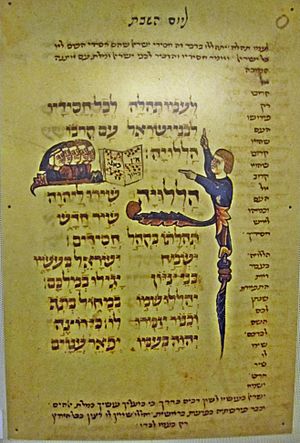Hallelujah facts for kids
Hallelujah (pronounced HAL-i-LOO-yuh) is a special word used to show thanks and worship. It's like saying "Praise God!" or "Thank goodness!" This word appears 24 times in the Hebrew Bible, mostly in the book of Psalms. You can also find it a few times in other religious books and four times in the Christian Book of Revelation.
Both Judaism and Christianity use "Hallelujah." In Judaism, it's part of the Hallel prayers. Christians also use it in their worship, especially in the Catholic Church and the Eastern Orthodox Church. They often use the form "alleluia", which comes from a Greek way of writing the word.
Contents
What Does Hallelujah Mean?
The word "Hallelujah" comes from the Hebrew language. It's a combination of two Hebrew words: halelū and yāh.
- Halelū means "praise ye!" or "praise him!"
- Yāh is a short form of YHWH, which is one of the names for God in the Bible.
So, "Hallelujah" literally means "Praise God!" or "Praise the Lord!" The Hebrew word hallel itself means a joyful song of praise.
Hallelujah in the Bible
You can find the word "Hallelujah" in 24 verses in the Book of Psalms. It often starts or ends many of these Psalms. For example, it appears in Psalms 104 through 106, and Psalms 145 through 150.
The Greek way of writing "Hallelujah" is "allēlouia." This form appears in some ancient Greek versions of the Bible, like the Septuagint. It also shows up four times in the Book of Revelation (chapter 19, verses 1-6). This is where Charles Jennens got the idea for the famous Hallelujah Chorus in Handel's musical work, Messiah. This Greek form is why many Christians also use the word "Alleluia."
How Jewish People Use Hallelujah
Jewish people sing "Hallelujah" as part of the Hallel Psalms. These are Psalms 113 through 150.
In Jewish tradition, some Psalms are recited daily during morning prayers. Psalms 145-150, also called the Hallel of pesukei dezimra, are included in the traditional Jewish Shacharit (morning) service. Also, during special holidays like the three Pilgrimage Festivals, the new moon, and Hanukkah, Psalms 113-118 are recited. These are simply known as Hallel.
"Hallelujah" also appears in the Kedushah, which is an important prayer said during morning and afternoon services when a group of ten or more Jewish adults (a minyan) is present.
How Christians Use Hallelujah
For most Christians, "Hallelujah" is a happy word of praise to God. It's not just an order to praise him, but an expression of joy.
The "Alleluia" is a traditional song in Christian worship. It combines the word "Alleluia" with verses from the Psalms or other parts of the Bible.
In the Catholic Church and many older Protestant churches, the Alleluia is not said or sung during the season of Lent. Lent is a time of reflection before Easter. Instead, a different saying is used. However, in Eastern Churches, "Alleluia" is sung throughout Lent at the start of their morning service. During the Easter season, a phrase like "Christ is risen!" is used instead of Hallelujah to show great happiness.
Many Protestants in modern worship services use "Hallelujah" and "Praise the Lord" freely. These are spontaneous ways to show joy, thanks, and praise to God during singing or prayer.
Hallelujah in Popular Culture
In everyday English, people often say "Hallelujah" to show happiness when something they hoped for finally happens. For example, it's used in the song "Get Happy" to express joy.
The song "Hallelujah" by Leonard Cohen (from 1984) is very famous. It was first turned down by his record company. But it became popular after being covered by artists like John Cale and Jeff Buckley. It became even more widely known when it was featured in the animated movie Shrek in 2001. When Leonard Cohen passed away in 2016, the song even made it onto the Billboard music charts.
Images for kids
See also
 In Spanish: Aleluya para niños
In Spanish: Aleluya para niños
 | John T. Biggers |
 | Thomas Blackshear |
 | Mark Bradford |
 | Beverly Buchanan |



